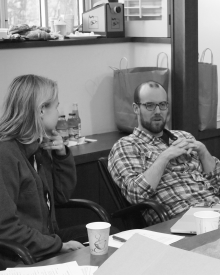Inequality & Decision Making
In recent years, economic inequality in the United States has reached heights not seen since the Great Depression. This rise in inequality lies at the center of a heated national debate: while some observers argue that the rise in inequality is one of the most pressing political and economic issues of our time, others dismiss it as a relatively harmless (and perhaps unavoidable) side effect of capitalist economic growth. A similar debated has played out in academic circles, and cross-national research has failed to detect consistent consequences of inequality. Despite the significant time and resources devoted to the study of inequality, we continue to lack a deep understanding of its effects on the health of our economy and democracy, leaving policymakers and others poorly equipped to evaluate and address this important issue.
After exploring various approaches to the study of economic inequality, the Tobin Project identified a promising avenue for new research that could help resolve these debates. We believe that the academic community may be able to develop our understanding of inequality’s macro level impact by investigating inequality’s effects on the behavior of individuals. In many ways, the political and economic health of society turns on the decisions people make - at work, at home, and in the voting booth; however, we know very little about how changes in inequality might affect individuals' decision making. Understanding how rising inequality affects people’s choices – perhaps by changing their risk tolerance, social affinities, or willingness to invest in public goods – would equip us to address the critical question of how inequality affects our democracy and economy more broadly.* In 2010, Tobin’s Economic Inequality initiative launched a strategic research inquiry aimed at exploring inequality’s impact on individual decision making with the hope of identifying the specific causal mechanisms by which it affects our democracy, economy, and society as a whole. The inquiry asks: How does inequality influence individuals’ behavior and decision making, and how might such influences affect the broader society?
Over the past six years, the Tobin Project’s Economic Inequality initiative has been working with a team of top scholars, including economists and psychologists from Princeton, Boston University, Harvard, and UCSF, to advance this research inquiry. With support from Tobin staff, this team has conducted several behavioral experiments that explore the effects of inequality on individual decision making. More recently, in order to expand the community of scholars committed to this inquiry, the Tobin Project hosted a conference on Inequality and Individual Decision Making in August 2016, which convened leading scholars from across the social and behavioral sciences and featured innovative pilot projects by junior scholars. Tobin’s Economic Inequality initiative is now working to build on the conversations from the conference by developing working groups organized around targeted questions related to our broader inquiry, including individuals’ ingroup- and outgroup-related attitudes and behaviors. * See Moss, David, Anant Thaker, and Howard Rudnick. "Inequality and Decision Making: Imagining a New Line of Inquiry." Harvard Business School Working Paper, No. 13-099, June 2013.


